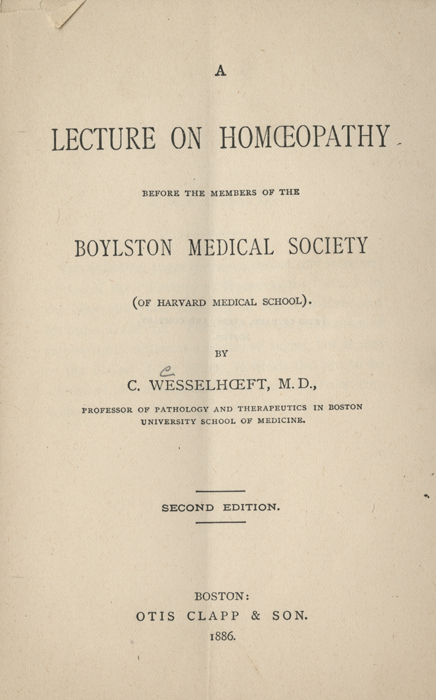The Decline of Homeopathy
Despite these conflicts, signs of a rapproachement between the allopathic and homeopathic factions begin to appear in the 1880s. Many of the violent practices of heroic medicine of the 18th and early 19th centuries had been abandoned by regular practitioners. In April 1886, Dr. Vincent Y. Bowditch, president of Harvard's Boylston Medical Society, addressed the Hahnemann Society of Boston University, and Dr. Conrad Wesselhoeft, the professor of pathology and therapeutics, spoke in turn to members of the Boylston Society, "as an omen of a better understanding and more congenial intercourse among physicians…. When the present opponents of homœopathy shall have realized how much they have lost by excluding a perfectly safe and practical method of using medicine; when many of those now termed homœopathists shall have fully relinquished false positions of mystical dosage and infallibility,--then the time will have come to abandon distinctive titles of 'regular' and 'homœopathist.' May we live to see the day!"
Henry Ingersoll Bowditch went even further, arguing that orthodox and homeopathic physicians should be permitted consultation without repercussion and that homeopaths should be allowed to join state medical societies after giving proof of sufficient medical study and experience. Horatio C. Wood promoted the idea that homeopathy had, in fact, been beneficial, inspiring allopaths to examine their methods of treatment and provide safer medical care for patients, and homeopathic remedies began to be incorporated into the allopathic pharmacopoeia. Locally, physicians such as Frederick C. Shattuck and Richard C. Cabot, pressed for unity between the factions, and even Sir William Osler dismissed the past factionalism: "A new school of practitioners has arisen which cares nothing for homeopathy and less for so-called allopathy. It seeks to study rationally and scientifically, the action of drugs, old and new. It is more concerned that a physician shall know how to apply the few great medicines which all have to use … than that he should employ a multiplicity of remedies the action of which is extremely doubtful."
In 1884, a Massachusetts Medical Examining Board was established by the state, with representation from allopaths, homeopaths, and eclectic practitioners. By the end of the 1880s, the Massachusetts Medical Society voted to allow graduates of homeopathic institutions to apply for fellowship, provided the physician renounced homeopathy. The American Medical Association also began to moderate its view, stating, in 1903, "The broadest dictates of humanity should be obeyed by physicians whenever and wherever their services are needed to meet the emergencies of disease or accident." The state medical societies could then admit graduates of homeopathic schools to membership.

